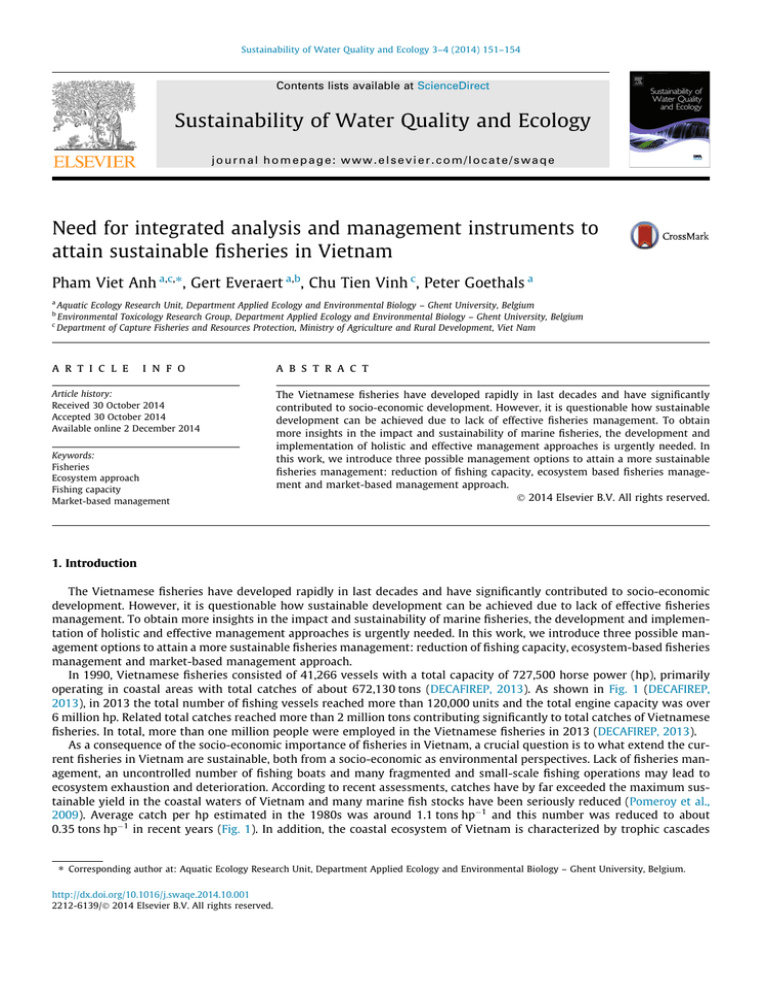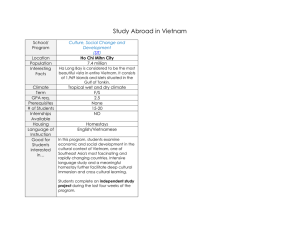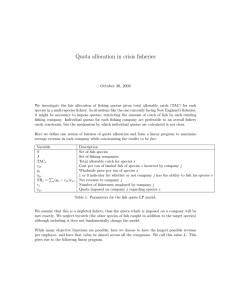
Sustainability of Water Quality and Ecology 3–4 (2014) 151–154
Contents lists available at ScienceDirect
Sustainability of Water Quality and Ecology
journal homepage: www.elsevier.com/locate/swaqe
Need for integrated analysis and management instruments to
attain sustainable fisheries in Vietnam
Pham Viet Anh a,c,⇑, Gert Everaert a,b, Chu Tien Vinh c, Peter Goethals a
a
Aquatic Ecology Research Unit, Department Applied Ecology and Environmental Biology – Ghent University, Belgium
Environmental Toxicology Research Group, Department Applied Ecology and Environmental Biology – Ghent University, Belgium
c
Department of Capture Fisheries and Resources Protection, Ministry of Agriculture and Rural Development, Viet Nam
b
a r t i c l e
i n f o
Article history:
Received 30 October 2014
Accepted 30 October 2014
Available online 2 December 2014
Keywords:
Fisheries
Ecosystem approach
Fishing capacity
Market-based management
a b s t r a c t
The Vietnamese fisheries have developed rapidly in last decades and have significantly
contributed to socio-economic development. However, it is questionable how sustainable
development can be achieved due to lack of effective fisheries management. To obtain
more insights in the impact and sustainability of marine fisheries, the development and
implementation of holistic and effective management approaches is urgently needed. In
this work, we introduce three possible management options to attain a more sustainable
fisheries management: reduction of fishing capacity, ecosystem based fisheries management and market-based management approach.
Ó 2014 Elsevier B.V. All rights reserved.
1. Introduction
The Vietnamese fisheries have developed rapidly in last decades and have significantly contributed to socio-economic
development. However, it is questionable how sustainable development can be achieved due to lack of effective fisheries
management. To obtain more insights in the impact and sustainability of marine fisheries, the development and implementation of holistic and effective management approaches is urgently needed. In this work, we introduce three possible management options to attain a more sustainable fisheries management: reduction of fishing capacity, ecosystem-based fisheries
management and market-based management approach.
In 1990, Vietnamese fisheries consisted of 41,266 vessels with a total capacity of 727,500 horse power (hp), primarily
operating in coastal areas with total catches of about 672,130 tons (DECAFIREP, 2013). As shown in Fig. 1 (DECAFIREP,
2013), in 2013 the total number of fishing vessels reached more than 120,000 units and the total engine capacity was over
6 million hp. Related total catches reached more than 2 million tons contributing significantly to total catches of Vietnamese
fisheries. In total, more than one million people were employed in the Vietnamese fisheries in 2013 (DECAFIREP, 2013).
As a consequence of the socio-economic importance of fisheries in Vietnam, a crucial question is to what extend the current fisheries in Vietnam are sustainable, both from a socio-economic as environmental perspectives. Lack of fisheries management, an uncontrolled number of fishing boats and many fragmented and small-scale fishing operations may lead to
ecosystem exhaustion and deterioration. According to recent assessments, catches have by far exceeded the maximum sustainable yield in the coastal waters of Vietnam and many marine fish stocks have been seriously reduced (Pomeroy et al.,
2009). Average catch per hp estimated in the 1980s was around 1.1 tons hp 1 and this number was reduced to about
0.35 tons hp 1 in recent years (Fig. 1). In addition, the coastal ecosystem of Vietnam is characterized by trophic cascades
⇑ Corresponding author at: Aquatic Ecology Research Unit, Department Applied Ecology and Environmental Biology – Ghent University, Belgium.
http://dx.doi.org/10.1016/j.swaqe.2014.10.001
2212-6139/Ó 2014 Elsevier B.V. All rights reserved.
152
P.V. Anh et al. / Sustainability of Water Quality and Ecology 3–4 (2014) 151–154
and this is reflected recent catches by the presence lower numbers of top predators and shift to species with a short life cycle
(Anh et al., 2014). The latter might be and indication of the so-called ‘‘fishing down marine food web’’ and that the
Vietnamese coastal ecosystems are being restructured, with their composition (richness and abundance) now being dominated by medium-sized species from lower trophic levels (Anh et al., 2014). To overcome shortcomings and to effectively
manage the fisheries in a more sustainable manner, the development and implementation of holistic and effective
management is urgently needed. In this paper, we present three different approached that can be implemented separately
and/or simultaneously for sustainable development of Vietnamese fisheries.
2. Reduction of fishing capacity
Coastal and near-shore fisheries is commonly considered to be over-capacity (Vinh et al., 2006). Moreover, due to lack of
enforcement of policy regulations to remove larger vessels fishing in inshore waters, an increased competition between
small and large vessel has been recognized (Tuan, 2012).
Various approaches to reduce over-fishing have been tried out without success in the past in Vietnam. For example, buyback schemes for small-scale fishers (the Government paid money to buy old and small vessels) have been tried in several
locations in Vietnam. Legal legislations to temporally or permanently prohibit fishing activities in some areas have been
adopted (MOFI, 2006; MARD, 2011a). However, the implementation of these legal legislations is either weak or lack a complete compliance of fishing communities (DECAFIREP, 2013). The main reason for this is that legal frameworks were only
based on top-down control management regimes with forcing from management agencies without involving relevant stakeholders on developing and implementing the legislations (Tuan, 2012). Given these realities, the only feasible solution may
be one based on a coordinated and integrated approach involving a mixed strategy of resource management (access control
and property rights), resource restoration, economic and community development (linkages of coastal communities to regional and national economic development). Moreover, these measures should incorporate poverty reduction as well as new
governance arrangements (co-management). Thus, in practical terms, reduction of over-capacity implies an increased focus
on people-related solutions as policies that reduce the number of fishers in small-scale fisheries without creating non-fishery
livelihood opportunities will inevitably fail. This is because it is otherwise expected that fishers will merely fish illegally, via
the investment in a new boat and gear to continue to make a living to feed their family. As such it is necessary to give fishers
and their families a broader range of livelihood options and to reduce the household’s economic dependence on the fishery.
However, this approach requires strong inter-ministerial and national and provincial and district government linkages to
ensure coordination and cooperation for planning and implementation.
3. Application of ecosystem-based management approaches
Conventional fisheries management most often aims to manage human activity in order to maximize fisheries production, economic benefits and employment. However, the historical impacts of fishing have been large and difficult to reverse
(Harvey et al., 2003). Fishing usually affects multiple components of the ecosystem (Griffiths et al., 2010). For example, there
is often by-catch of non-targeted species, physical damage to habitats and food-chain effects. Consequently, fishing can and
is likely to alter the structure and function of marine ecosystems (Pauly et al., 1998). In recent years there has been a growing
interest in the use of ecological models that can assess the impact of fisheries in a more integrated manner and help to select
more sustainable management options via the analysis of simulations (FAO, 2008).
Fig. 1. Catch of capture fisheries of Vietnam and productivity index (catch per unit effort). Adapted from an official report of Department of Capture
Fisheries and Resources Protection, Vietnam (DECAFIREP, 2013).
ID
1064676
Title
NeedforintegratedanalysisandmanagementinstrumentstoattainsustainablefisheriesinVietnam
http://fulltext.study/article/1064676
http://FullText.Study
Pages
4



![vietnam[1].](http://s2.studylib.net/store/data/005329784_1-42b2e9fc4f7c73463c31fd4de82c4fa3-300x300.png)

